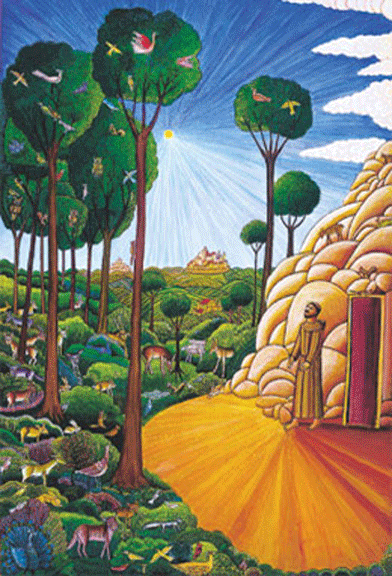Texts:
Genesis 1: 20-25
Isaiah 11: 6-10
St. Francis Feast day this past week.
Reminded of that, b/c of our wonderful visitors from the zoo.
Always been inspired by St. Francis. Great books I’ve read.
Who was he and why should we care:
Known for preaching to the birds, brokering a peace accord between a wolf and a village, and founding a monastic order devoted to poverty and preaching, living within a community.
In case you think of him as kind of hippy-dippy head in the clouds kind of guy, he also was an ambassador. Travelled to the heart of the Muslim empire in Egypt to persuade a great warrior, Saladin, to make peace with the Crusaders who had attempted to take land that he protected.
He also persuaded a pope to accept practices that had earned excommunication in earlier spiritual leaders.
But, he remains for us the patron saint of animals and nature. Many churches have a blessing of the animals.
Always remember this argument in childhood, and maybe it’s something of a contentious issue in adulthood. “Do all dogs go to heaven?”
Of course they do. God created them, and God’s heaven is coming to earth to redeem “all creation, which is groaning out for redemption.”
I have heard the counter-arguments:, well, animals don’t have souls, so they can’t go to heaven. Show me where it says that in the Bible in a place that does not also speak of the same fate for humanity.
Ecclesiastes3 . I also thought, "As for men, God tests them so that they may see that they are like the animals. 19 Man's fate is like that of the animals; the same fate awaits them both: As one dies, so dies the other. All have the same breath [b] ; man has no advantage over the animal. Everything is meaningless. 20 All go to the same place; all come from dust, and to dust all return. 21 Who knows if the spirit of man rises upward and if the spirit of the animal [c] goes down into the earth?"
As Ecclesiastes and Psalm ? say, God’s Spirit, God’s Breath, gives all things life.
Instead, scripture frequently speak of animals being involved in the New heaven and the New Earth. Isaiah speaks of the animals laying down with one another as they once had in Eden.
According to scripture, we’re the reason that animals too are subject to death. It is mankind that caused the fall from grace.
The good news for us, is that God redeems us (and the animals.) Why would God redeem the creatures who caused all this mess and leave all the innocent animals behind. The animals didn’t eat the forbidden fruit, the people did.
John Wesley had this same outlook on the animal kingdom. In fact, it played into his decision to refrain from eating meat. The only reason he, after years of being a vegetarian, resumed eating meat was because his bishop was suspicious that he may be turning into a radical, and Wesley wanted to prove that he wasn’t one.
Wesley’s conundrum echoes today for us. It is easy to think of our pets as having souls, perhaps even wild animals as having souls, but then livestock comes into play.
Does believing an animal have a soul get in the way of my diet? This is an area where the “school of thought” prevalent at my seminary, Process Theology, gives me some tools to live.
In this system, creatures with greater comprehension of the world around them have a greater amount of input from God. In a sense, humans have a “bigger” soul than a wasp or a fish. So, when we choose to slaughter an animal and eat it, it is less offensive to the giver of that life-breath if we take care to “minimize the loss.”
Cows and chickens have a relatively low comprehension of the relational world. Horses seem to have a greater awareness, don’t they? Perhaps this is the reason we bristle at the idea of eating a horse or a dog.
They are more aware of our company, they seem to care for us more than a cow or a chicken.
I think the practice you find in many of the records about native Americans of offering a prayer of thanksgiving before taking the life of an animal is commendable.
It is a way to acknowledge the presence of God in the world around us that strengthens our own understanding of the relationship between God and us.
That’s why we bless the animals. Because the animals are a blessing to us. It’s not really us giving some kind of perk to the animals that they don’t already have—it’s simply us acknowledging God’s blessing in relationship and in all life.
I’m sure most of us have had relationships with animals. Perhaps it’s a cat who likes to snuggle up over your bare feet because she knows you like it. Perhaps it’s a dog who was protective of you as a child. Maybe it’s a horse who carries you on his back and communicates with you in an unspoken language.
In all things, we find God’s desire for a relationship with us. And if we’re patient and observant, we might be blessed to see the relationship that God has with those animals and wildlife as well.












No comments:
Post a Comment